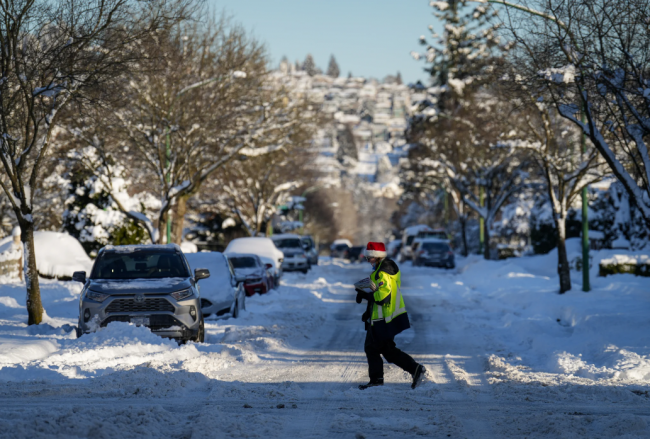Articles Menu

Dec. 22, 2022
Like many Canadians, Colin McCarter is awaiting his father’s arrival to celebrate the holidays with him and his family in North Bay, Ont. However, he warned his dad about the impending storm and the challenges he may face on his nearly 400-kilometre drive north from the Greater Toronto Area.
McCarter, the Canada Research Chair in Climate and Environmental Change at Nipissing University in North Bay, thinks about extreme weather a lot. His studies revolve around how disturbances like climate change impact our landscape.
Some are calling this holiday weather the storm of the century.
But this, says McCarter, is just one of the many “storms of the century” to hit Canada in the last few decades.
Climate change is driving shifts in the rain and snow patterns we experience every day. Some of the more extreme weather events are caused by a climate change-driven intensification of the water cycle. Essentially, it's “the water cycle on steroids,” he says.
“Something that we'd expect statistically to happen once every 100 years, ends up occurring once every five years or once every 10 years.”

It’s hard for experts to definitively link extreme weather to climate change because there are so many variables. Science likes to have laser-like precision, linking cause and effect, which takes time. However, as time goes by and evidence builds, McCarter says the scientific community is more often speaking with one voice. “I would say there's a movement towards a consensus that climate change is driving extreme weather,” he says, and scientists are increasingly raising alarms.
“I don't think people realize just how much trouble we're in when it comes to climate change,” McCarter says.
Canada’s Changing Climate Report released in 2019 says the country’s “climate has warmed and will warm further in the future, driven by human influence,” and this warming is “effectively irreversible.”
Some are calling the weather set to hit Ontario over the holidays the storm of the century. But this is just one of the many ‘storms of the century’ to hit Canada in the last few decades, says one expert. #ExtremeWeather #ClimateChange - Twitter
It may be counter-intuitive to think more snow and winter storms, like the one expected this week, are evidence of global warming, but they are. Changes in atmospheric processes drive these storms. The destabilization of the polar vortex in the Arctic pushes this cold air farther south, which then changes air temperatures. With more moisture in the air, we can expect more blizzards.
People often need clarification about climate and weather. They may think they are the same thing ― but they’re not. Climate affects weather.
Weather is short-term. If you look outside, it’s what you will see. It’s raining. It’s windy. “Wow, it’s humid out” or “it’s 33 C in Regina.”
Climate, however, is long-term. Experts look at weather patterns measured over many years.
Canada’s Changing Climate Report states the annual average temperature over northern Canada has increased by 2.3 C since 1948. As the climate warms up, these weather events are going to intensify. McCarter says that if we continue to do nothing to control climate change, we'll likely see more impacts on our quality of life.

Environment Canada is asking people to consider altering their plans through the holiday weekend. All of Canada will be affected by this adverse weather ― from the winter storm watch stretching from the territories to B.C. and from Ontario to the East Coast to extreme cold advisories for Alberta and the Prairies.
Public Safety Canada encourages residents to make an emergency plan that includes an emergency kit with drinking water, food, medicine, a first-aid kit and a flashlight.
“This isn't an abstract scientific thing anymore. Climate change and extreme weather are occurring right now,” McCarter warns. “And it's gonna affect our children and grandchildren more than we know.”
Yet, despite a consensus on climate change, we still don't know what warming our planet has done and how it will all end.
“We just don't know. And that's kind of scary,” McCarter says.
[Top photo: A Canada Post letter carrier crosses a snow and ice covered road while delivering mail in Burnaby, B.C., on Wednesday, December 21, 2022. Photo by: The Canadian Press/Darryl Dyck]